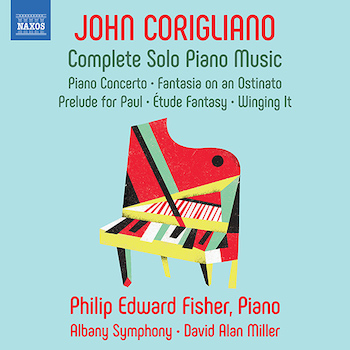Classical Music Album Review: John Corigliano’s Piano Music
By Jonathan Blumhofer
An album that does admirable justice to one of the most prolific, significant, and increasingly long-lived composers of a remarkable generation.

John Corigliano hasn’t written an excessive amount of music for the piano. And this new recording from Philip Edward Fisher and the Albany Symphony Orchestra (ASO) isn’t quite comprehensive: there’s no Chiaroscuro or Kaleidoscope on offer. But it is worth noting that, of the five selections presented here, all but the short, hypnotic Prelude for Paul occupy striking, singular terrains.
The Concerto for Piano and Orchestra is the earliest and (I mean this in the most nondisparaging way possible) most derivative of those. Bartók and, particularly, Samuel Barber never seem too far removed, especially in the second and fourth movements (Barber’s own Pulitzer Prize-winning Concerto was only six years old when Corigliano’s entry in the genre was premiered in 1968).
So it says something that Fisher’s performance here feels and sounds so fresh and vital. He shapes the first movement’s solo line with an abundance of character, not to mention a brilliant sense of rhythm and color. Throughout, his playing is clean and well balanced, and nowhere more impressive than in the delicate dovetailing between piano and clarinets before the end of the Appassionato. The diabolical little fugue at the start of the finale, too, is a doozy.
David Alan Miller and his forces are with Fisher each step of the way. The rich, lyrical second subject in the Molto Allegro soars; so do the huge climaxes in the third movement. Balances are never in question — the ASO sounds full but never covers the soloist; and, if the final cadence sounds a bit dense, well, that’s pretty much par for the course.
Fisher is likewise impressive in the Fantasia on an Ostinato and Etude Fantasy.
In the first, his flexibility of rhythms and phrasings belie a strong sense of structure, balance, and textural clarity. Indeed, this is about as cleanly voiced a Fantasia as they come.
The Fantasy is similarly lean, colorful, and clean. Yes, “Ornaments” pummels, but somehow — even in its lowest registers — Fisher’s reading never becomes blurry. And the concluding “Melody” packs a haunting, emotional wallop.
Rounding everything out is Winging It, a triptych of semi-improvisations Corigliano penned in 2007 and ’08. The outer movements are slashing and pulsing. But it’s the middle one — reflective; a touch jazzy; marked by intense, bluesy outbursts — that’s something altogether unique. Beneath the unsettled, bristly things the composer has written, this near-seven-minute essay feels (or at least seems) like a revelation, especially when heard in close context with the Concerto of 40 years earlier.
As such, it’s a special inclusion on an album that does admirable justice to one of the most prolific, significant, and increasingly long-lived composers of a remarkable generation.
Jonathan Blumhofer is a composer and violist who has been active in the greater Boston area since 2004. His music has received numerous awards and been performed by various ensembles, including the American Composers Orchestra, Kiev Philharmonic, Camerata Chicago, Xanthos Ensemble, and Juventas New Music Group. Since receiving his doctorate from Boston University in 2010, Jon has taught at Clark University, Worcester Polytechnic Institute, and online for the University of Phoenix, in addition to writing music criticism for the Worcester Telegram & Gazette.
Tagged: Albany Symphony Orchestra, John Corigliano, Naxos
